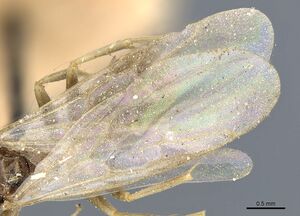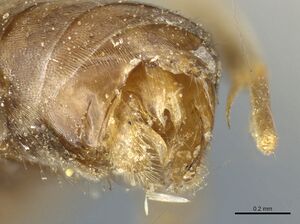Tapinoma christophi
| Tapinoma christophi | |
|---|---|

| |
| Scientific classification | |
| Kingdom: | Animalia |
| Phylum: | Arthropoda |
| Class: | Insecta |
| Order: | Hymenoptera |
| Family: | Formicidae |
| Subfamily: | Dolichoderinae |
| Genus: | Tapinoma |
| Species: | T. christophi |
| Binomial name | |
| Tapinoma christophi Emery, 1925 | |
Nothing is known concerning the biology of this species.
Identification
Distribution
Distribution based on Regional Taxon Lists
Palaearctic Region: Lebanon, Russian Federation (type locality).
Distribution based on AntMaps
Distribution based on AntWeb specimens
Check data from AntWeb
Countries Occupied
| Number of countries occupied by this species based on AntWiki Regional Taxon Lists. In general, fewer countries occupied indicates a narrower range, while more countries indicates a more widespread species. |

|
Estimated Abundance
| Relative abundance based on number of AntMaps records per species (this species within the purple bar). Fewer records (to the left) indicates a less abundant/encountered species while more records (to the right) indicates more abundant/encountered species. |

|
Biology
Castes
Images from AntWeb
 
| |
| Specimen code casent0904025. . | |
Nomenclature
The following information is derived from Barry Bolton's Online Catalogue of the Ants of the World.
- christophi. Tapinoma christophi Emery, 1925d: 60, fig. 13 (m.) RUSSIA.
Type Material
Seifert et al. (2024) - The species has been described only on the base of males collected by Christoph at Sarepta (48.512°N, 44.550°E) south of volgograd. Investigated were two syntype males (one without gaster) labelled “Sarepta Christoph”, “T. christophi Emery” [both in Emery’s handwriting], “ANTWEB CASENT 0904025”, “SYNTYPUS Tapinoma christophi Emery, 1925”. Depository MCSN Genova.
Taxonomic Notes
Seifert et al. (2024) - Tapinoma christophi is considered here as a valid species because the undamaged syntype male shows a number of extreme characters which exclude a synonymy with any species in which males are known. It is a combination of rather small size (CS=764 µm), extremely short scape (SL/CS 0.948), short head (CL/CW 0.847) and very shallow clypeal excision (ExCly/CS 1.81%). The genital is also unusual. In ventral view, the caudal ends of the basimeres are semicircular and do not surpass the apices of the subgenital plate. The tips of harpago surpass the tips of the subgenital plate by a distance nearly equal to the depth of the excision of the subgenital plate. Considering the extreme data of head characters and that we have correlation of male and female characters in Tapinoma, T. christophi might be related to Tapinoma sinense the workers of which are likewise a combination of rather small size, extremely short scape, short head and very shallow clypeal excision (Tab. 7). The question if T. christophi might be a synonym of T. sinense cannot be answered in reasonably short time and will probably require the study of variation in sufficiently large male material of both taxa.
Description
References
- Berville, L., Hefetz, A., Espadaler, X., Lenior, A., Renuuci, M., Blight, O., Provost, E. 2013. Differentiation of the ant genus Tapinoma (Hymenoptera: Formicidae) from the Mediterranean Basin by species-specific cuticular hydrocarbon profiles. Myrmecological News 18: 77-92.
- Borowiec, L. 2014. Catalogue of ants of Europe, the Mediterranean Basin and adjacent regions (Hymenoptera: Formicidae). Genus (Wroclaw) 25(1-2): 1-340.
- Dubovikoff, D.A., Yusupov, Z.M. 2017. Family Formicidae - Ants. In Belokobylskij S. A. and A. S. Lelej: Annotated catalogue of the Hymenoptera of Russia. Proceedingss of the Zoological Institute of the Russian Academy of Sciences 6: 197-210.
- Emery, C. 1925d. Hymenoptera. Fam. Formicidae. Subfam. Formicinae. Genera Insectorum 183: 1-302 (page 60, fig. 13 male described)
- Seifert, B., Kaufmann, B., Fraysse, L. 2024. A taxonomic revision of the Palaearctic species of the ant genus Tapinoma Mayr 1861 (Hymenoptera: Formicidae). Zootaxa 5435(1), 1-74 (doi:10.11646/zootaxa.5435.1.1).
References based on Global Ant Biodiversity Informatics
- Dubovikoff D. A., and Z. M. Yusupov. 2018. Family Formicidae - Ants. In Belokobylskij S. A. and A. S. Lelej: Annotated catalogue of the Hymenoptera of Russia. Proceedingss of the Zoological Institute of the Russian Academy of Sciences 6: 197-210.
- Emery C. 1925. Revision des espèces paléarctiques du genre Tapinoma. Revue Suisse de Zoologie 32: 45-64.
